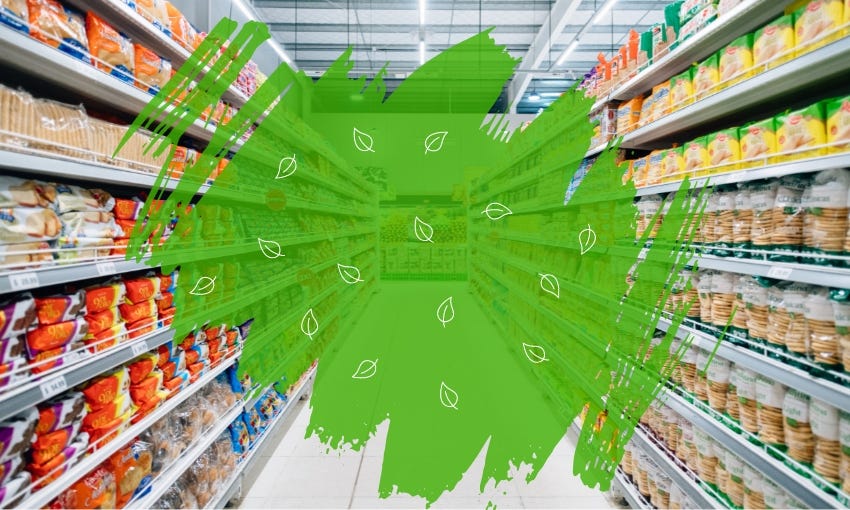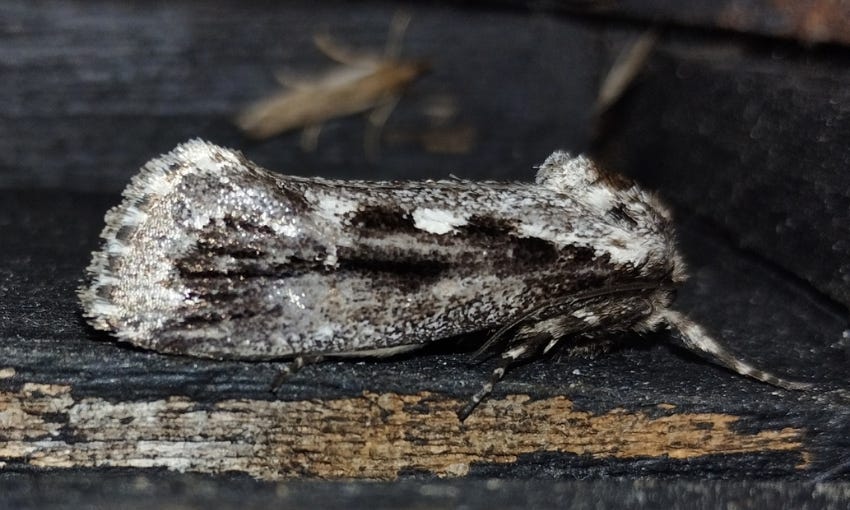New Zealand has a greenwashing problem
Our supermarket aisles are teeming with misleading sustainability buzzwords.
Kia ora, welcome to Future Proof. I’m Ellen, thanks for joining me this week.
The loo paper in my shopping basket is “earth smart”. The cotton buds, “earth kind”. The packet of cinnamon is “eco”. Like many shoppers perusing the supermarket aisles, buying stuff that’s better for the planet is on my mind.
Sustainability is second only to price when it comes to choosing what to purchase, says Gemma Rasmussen, head of research and advocacy at non-profit Consumer NZ. Forty-four percent of us will switch to a greener-sounding brand – and pay a little extra – if we think it’s more sustainable.
But in many cases, we’re being tricked. The supermarket is an area “rife with greenwashing,” says Rasmussen, referring to the use of meaningless marketing terms and visual cues to persuade shoppers that a product is environmentally friendly.
In an audit, Consumer investigators filled a shopping basket with products and painstakingly scrutinised their green claims, with alarming results. For example, you might think that bin liners made with 50% “ocean plastic” would be made with rubbish collected from the sea. But the label actually refers to plastic picked up within 50km of the coast.
Rasmussen says the government must prioritise greenwashing and fund a comprehensive survey, so we can understand just how bad this problem is. Overseas, sweeps of supermarket shelves have found 40–50% of green claims are unclear or unsubstantiated. “We have suspicions that something similar is happening in New Zealand,” she says.
EU introduces greenwashing rules while NZ lags
While New Zealand is yet to even size up the scale of greenwashing, other jurisdictions are forging ahead with new rules. By 2026, an EU-wide ban on generic buzzwords like “eco” will come into force. Companies wanting to make claims about the sustainability credentials of their products will need to submit evidence to an approved certification scheme. “What that means is as a shopper, you are able to shop with confidence because you know that everything that ended up on shelves has been vetted,” says Rasmussen.
Rasmussen would like to see similar proactive legislation in New Zealand, because “it shouldn’t be the responsibility of the general public” to decipher vague green claims. “I’m really involved in greenwashing and I can't tell what are genuinely sustainable products and what are not.”
Currently, the Commerce Commission provides environmental guidelines – which aren’t legally binding – and businesses must abide by the Fair Trading Act, which broadly says you can’t mislead or deceive people. But the system is broken, Rasmussen says, “We have a Commerce Commission that doesn't have the capacity to prosecute, we have a government who's not prioritising it. We also have businesses who are at a competitive disadvantage because they don't engage in this.”
Taking on greenwashing in the High Court
Consumer NZ is taking their advocacy to the High Court, joining forces with Lawyers for Climate Action and the Environmental Law Initiative to take legal action against the second largest emitter in New Zealand, Z Energy. The case alleges that Z’s “Moving with the times” ad campaign constitutes “audacious” greenwashing. “We’re in the business of getting out of the petrol business,” the ads proclaim, highlighting cleaner energy initiatives. “It would be reasonable for any member of the public, who is looking at that campaign, to think that they're talking about getting out of fuel sales,” says Rasmussen. “In reality, their fossil fuel sales and carbon emissions are increasing… We just think that level of major corporate greenwashing is not OK.” Z Energy filed their defence statement earlier this year.
Ultimately, there’s power in numbers, Rasmussen says, which is why Consumer NZ is calling for Kiwis to sign on to their greenwashing campaign and submit examples of dodgy eco claims for investigation.
“We know it's really hard to identify greenwashing. But if people are seeing things that they do think are quite sus, reach out to us because we are really happy to look into that.”
Join The Spinoff members, now with comments
Spinoff members are now able to comment on certain stories. It’s another way for us to bring to life the value of belonging to the community of Spinoff supporters. I explain why we’re doing this here, and if I ever publish another big food ranking, you have my permission to give me your worst. It’s just one of the perks of being a Spinoff supporter.
Today you can also chime in on:
what Auckland will be like 50 years from now – do you agree with Tommy de Silva’s dream for the city?
how New Zealand can embrace the urban revolution, according to the former commissioner of the New York City Department of Transportation.
Log in, let us know what you think, and as always, we’d be grateful if you’d consider becoming a Spinoff supporter if you’re not already.
See you in the comments sections,
Madeleine Chapman, Editor
Climate change commission advises strengthening 2050 targets
The Climate Change Commission has released three draft proposals as part of its regular reviews of New Zealand’s climate targets. These consider whether our emissions budgets should change, whether to alter our 2050 target, and whether to include international shipping and aviation in our targets. Newsroom’s Marc Daalder has compiled five key takeaways from the three documents.
The new advice comes as the government announced plans for an independent panel to review the science on methane, a potent greenhouse gas burped by cattle and sheep, and the country’s 2050 methane reduction targets. The commission’s just-released proposals advise that there is “no evidence to support weakening the current 2050 target, and enough to consider strengthening it,” Marc Daalder reports. Meanwhile, the Parliamentary Commissioner for the Environment’s chief economist told RNZ’s Eloise Gibson that the science on methane is already settled, with only the political question of fairness left to solve.
What will Tāmaki Makaurau look like 50 years from now?
In an era where dystopian tales are culturally pervasive – and where it can sometimes feel like we’re living in a Black Mirror episode – there’s something refreshing (and potentially powerful) about a hopeful daydream. Tommy de Silva imagines that Auckland is a thriving sustainable city in 2074, with restored awa and moana, and blissfully car-free transport options. Also on the topic of cities, Joel McManus interviews famed urbanist Janette Sadik-Khan, an early leader in the shift towards more pedestrian, cycling, and public transport-focused urban design.
School strike for climate fires up
Thousands of students (and adults) protested climate inaction across 20 events held throughout Aotearoa last Friday. The group’s six demands expanded beyond climate action, and included ending the genocide in Palestine, lowering the voting age to 16, and honouring Te Tiriti, alongside climate education for all, getting rid of the Fast Track Approvals Bill, and keeping the oil and gas ban. The wide-ranging approach was questioned on the AM Show, and defended by economist Rob Campbell, who writes that young people expressing their hopes should not be scoffed at, but rather welcomed.
Coming soon on The Spinoff: Checkered Flag
In 2023, Gary Stirling, circuit manager at the Pukekohe Park Raceway closed the gates for the last time. The raceway had hosted professional and community motorsports events for 60 years and is now being demolished to make room for horse racing facilities. “Time moves on, Puke’s gone,” he said.
Checkered Flag is a one-off documentary coming to The Spinoff on Tuesday, April 16. It follows Stirling and his daughter in the months leading up to the last day ever at the racecourse. They register drivers, clean up after the Auckland floods, and say goodbye to what is so much more than a paddock with asphalt on it.
Checkered Flag is made with the support of NZ On Air.
More stories
Green Party MP James Shaw wants to amend the Bill of Rights Act to include the right to a sustainable environment. WWF-New Zealand CEO Kayla Kingdon-Bebb explains why that's so important.
The Spinoff’s Gabi Lardies contemplates the deteriorating state of Tīkapa Moana the Hauraki Gulf in an essay documenting a summer spent watching the ocean.
Thirty-one countries have passed an electric vehicle tipping point, according to a Bloomberg analysis – although New Zealand’s EV sales have dramatically dropped this year.
Slovakia plans to be coal-free by mid-2024, six years ahead of schedule.
Just 57 fossil fuel entities are responsible for 80% of carbon emissions since the 2015 Paris agreement.
Solar panels are now so cheap that people in the Netherlands and Germany are using them to build garden fences.
Greenpeace delivered the “world’s tiniest violin” to the CEO of Shell in response to the “Cousin Greg” lawsuit.
Cycling immerses you in everything your city has to offer and promotes mauri-sharing interactions, Tommy de Silva writes on The Spinoff.
Three cyclists from South Auckland reveal their favourite local routes and why they love to cycle in the latest instalment of Two wheels, to where?
Happy birthday to iconic conservationist Jane Goodall, who turned 90 last week and celebrated the occasion with 90 dogs.
Image credit: Pav Johnsson via iNaturalist NZ (CC BY 4.0).
To finish this issue, the frosted phoenix has risen from the ashes of possible extinction. This moth species, last seen 65 years ago, was rediscovered by a tourist on a hotel balcony on Rakiura Stewart Island. Unable to identify the moth on his own, Pav Johnsson uploaded the photo to iNaturalist, where it was identified as the elusive “holy grail of NZ moths”. The rediscovery has excited lepidopterists and Rakiura locals alike, with searches planned to find a specimen and hopefully unravel the mystery of this long-lost species.
Thanks so moth for reading,
Ellen
Future Proof is looking for a sponsor!
Connect your brand with an insightful exploration of environmental news, reaching influential readers committed to sustainability and staying informed about the state of our natural world. Contact commercial@thespinoff.co.nz to learn more.
Got some feedback about Future Proof or topics you’d like covered? Get in touch with me at futureproof@thespinoff.co.nz













Why buy air freshener in the first place: open a window. Cut down on animal products: better for you, better for the planet. Why not buy loose tea and use a teapot? It's cheaper and the quality of the tea is better. Healthy babies have been brought up for years without wet wipes: why have they suddenly become one of life's necessities? In spite of my best endeavours, I still end up with plenty of plastic bags and use these for my small rubbish bin. Avoid buying junk food: better for you, better for the environment. I take my own bags to Bin Inn for herbs and spices - and save a lot of money into the bargain. I don't use cotton buds, but have seen them made with bamboo.
The packaging of all these things is an issue: bio-degrable or not, it's a waste of precious resources to have single use packaging, We need to insist on being able to buy more things without the pre-packaging, and to be prepared to forgo convenience for the sake of the planet.
Think before you buy. Ask 'do I really need this?' See if there's an alternative. It all takes time and effort, but people managed for years without so much of what we buy without a second thought. So many of the things we believe we have to have, are developed with no other purpose than to create a demand for something we can easily live without. We all have to learn to refuse to make refuse.
100% Pure NZ - Yeah right.